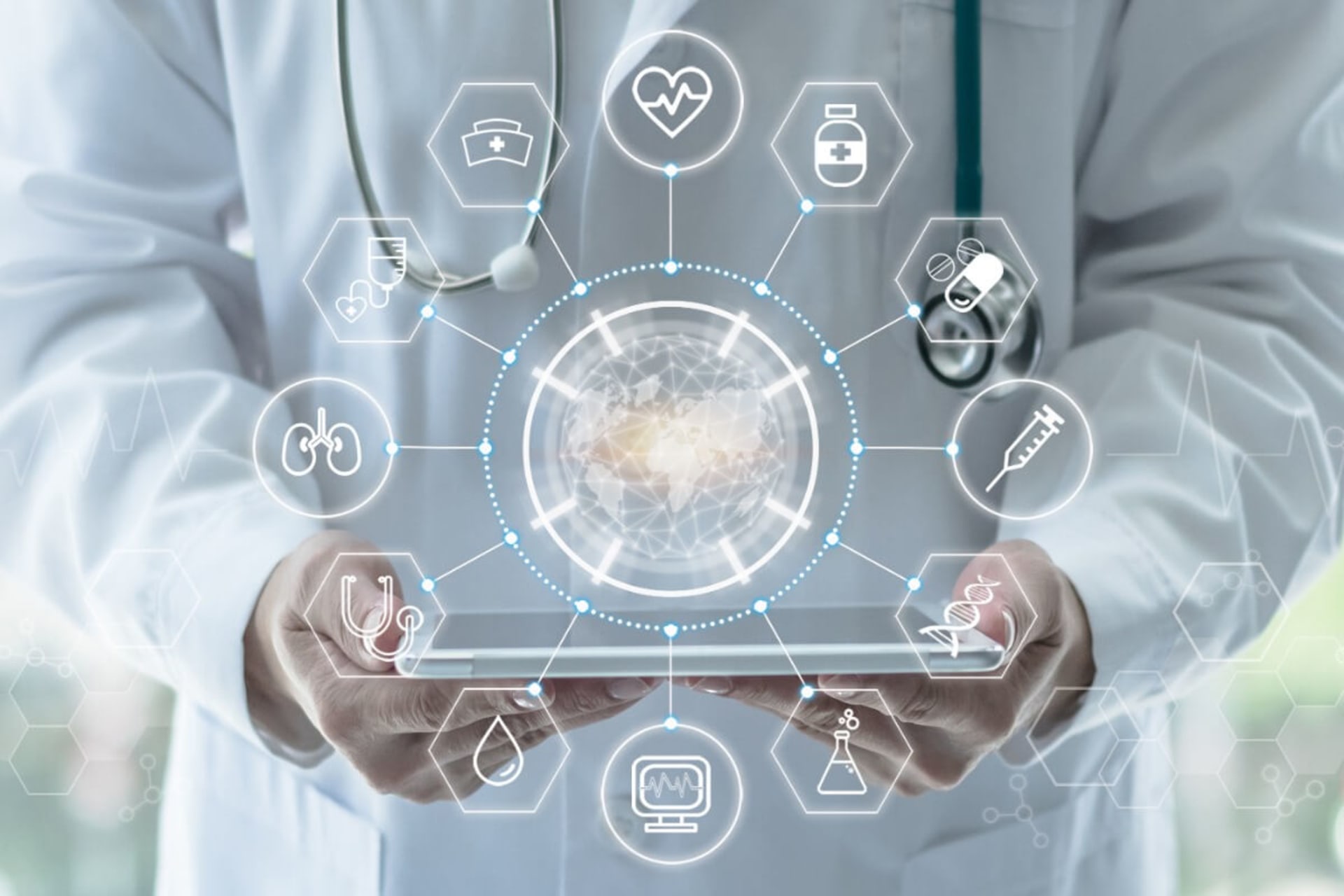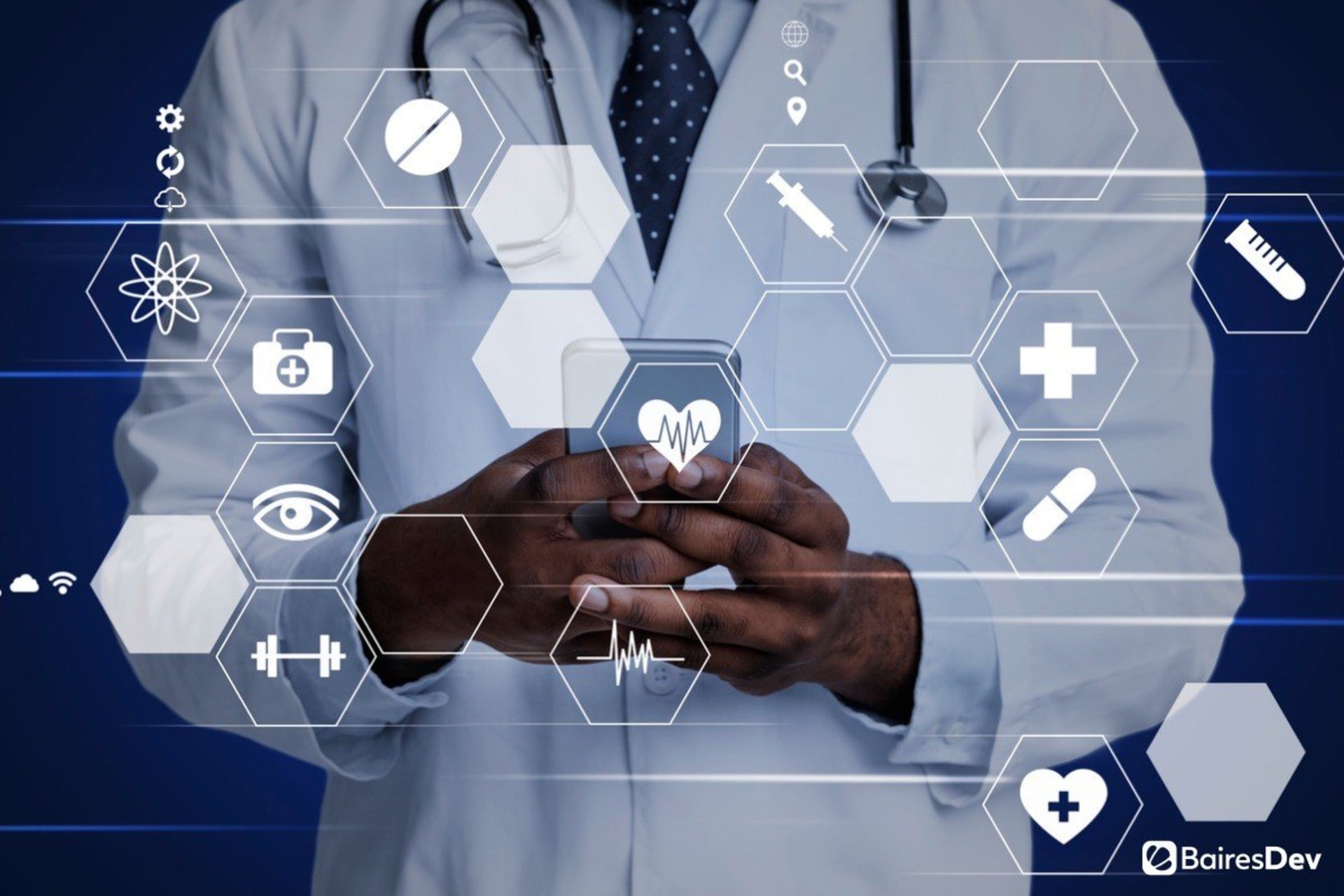- Home
- Industries
- Healthcare
Healthcare Software Development
Create HIPAA-compliant healthcare software that improves operational efficiency and patient care outcomes.
500+ companies rely on our top 1% tech talent.
Healthcare software development services we provide
Custom Healthcare Software Development Services
Centralize patient information, streamline administrative tasks, monitor treatments remotely, and more. Various medical institutions use custom healthcare software to provide more accurate and efficient patient care. As experts in 100+ technologies, we help you build robust, legally-compliant medical software that scales as your needs evolve.
Telemedicine App Development
Connect patients and providers, no matter the distance. Telemedicine apps facilitate secure, contactless, real-time consultations. Discuss symptoms, diagnose, and treat patients through video calls or live chat. Make your healthcare services accessible to more people, even in remote locations.
Healthcare Management Systems
Increase productivity by organizing and automating your daily processes. Build management systems that handle everything from patient admissions to medical billing, freeing up staff for critical care tasks.
Healthcare Cloud Solutions
Not only do we ensure top-tier security to protect sensitive patient data, but our cloud infrastructure is also designed to scale as your needs grow. Benefit from instant access to patient data and medical histories. Plus, with automated system backups, you won’t need to worry about data loss.
Healthcare Integrations
We bridge different healthcare platforms, allowing them to communicate and share crucial data. Whether you’re linking a pharmacy's inventory system to a hospital's EHR or a private clinic's billing system, our integrations ensure seamless third-party connections.
Data & Analytics
We apply statistics and ML/AI algorithms to turn vast amounts of data into actionable insights. Dive deep into predictive analytics to anticipate patient needs, understand emerging patient trends, optimize care strategies, and access comprehensive operational reports. Make more informed decisions that lead to better patient outcomes.
Modernization
Upgrade, don't replace. We revamp legacy systems, bringing them up to date with today's healthcare standards. Update older EHRs. Revive outdated patient portals. Our modernization ensures your institution remains at the forefront of medical innovation.
Types of custom healthcare software we develop
Electronic Health Records (EHR)
With healthcare software development, centralizing patient data is essential. It improves collaboration and accessibility amongst healthcare providers. Our EHR solutions cover everything from medical history to recent treatments
Patient Portals
We offer healthcare providers a digital gateway for patients, allowing them to manage appointments, view medical results, and maintain seamless communication with healthcare providers.
Telemedicine Platforms
Our healthcare software development services empower healthcare providers with platforms for remote consultations. These allow patients to connect with medical professionals without leaving their homes.
Medical Imaging Systems
Dive deep into diagnostic visuals. We build systems that allow healthcare professionals to capture, store, and analyze a range of diagnostic images, from X-rays to MRIs, enhancing their healthcare services.
Laboratory Information Systems (LIS)
In line with the dynamic needs of the healthcare industry, our LIS solutions streamline laboratory processes, making processes like sample tracking and results distribution more accurate and efficient.
Pharmacy Management Systems
Our pharmacy software solutions simplify medication dispensing, inventory checks, financial reports, and more.
Billing and Revenue Cycle Management
Control finances and reporting. Automate everything, from claim submissions to collections, guaranteeing financial accuracy and sustainability. This is an ideal solution for hospitals and health insurance companies.
Clinical Decision Support Systems
By leveraging enormous amounts of medical data, we give healthcare providers real-time, evidence-based recommendations to improve patient care outcomes.
Wearable Health Tech Integration
Our integrations offer continuous patient monitoring and data collection. This leads to personalized health insights and better rehabilitation support.
Mobile Medical Applications
In today's fast-paced healthcare industry, on-the-go access is pivotal. Our apps provide professionals and patients with quick access to resources, data, and care management tools, elevating the standard of healthcare services.
Women’s Care Apps
Create custom apps that track menstruation, ovulation and assist in pregnancy planning.
Other Applications
Explore a variety of additional software possibilities, including fitness apps, surgical assistance AR, online drugstores, smart beds and portable health device software.
Case study
BairesDev has become an integral development partner for Gennev. We provide highly skilled engineers in the areas of front-end interface design, site reliability, scalability, and maintenance. As in all projects related to the healthcare industry, security measures are prioritized as they are critical due to confidentiality issues and because of the need to comply with industry data standards such as HIPAA. Read the full case study.

Benefits of building bespoke solutions
1. Tailored to Your Needs
Going the custom software route is advantageous for many reasons. The biggest benefit: you get a product that aligns with your specific challenges, workflows, and healthcare requirements. This ensures a more precise fit compared to off-the-shelf solutions.
2. Enhanced Data Security
Custom healthcare software offers enhanced data protection tailored to your organization's needs. Unlike off-the-shelf products with known vulnerabilities, custom solutions can reduce breach risks by addressing specific threats and allowing swifter security updates. It's a proactive approach to safeguarding your patients' sensitive data.
3. Seamless Integration
Custom healthcare software smoothly integrates with established healthcare platforms and systems, such as EHRs or LISs. This eliminates the integration challenges that healthcare providers often face with off-the-shelf solutions.
4. Scalability
As the healthcare industry evolves, so can your custom software. Expand and adapt to the changing needs of healthcare providers and patients, free from the constraints and additional costs associated with platform-based tools.
5. Ownership and Autonomy
With custom healthcare software development, providers enjoy complete autonomy over features, updates, and data management. This reduces dependencies and ensures the software continues to align with the company’s unique demands.

Which institutions benefit from custom healthcare software development?
Various healthcare organizations, ranging from hospitals, and pharmacies to diagnostic labs and rehabilitation centers, greatly benefit from custom healthcare software development. Tailored solutions address their unique challenges, ensuring optimized workflows, improved patient care, and streamlined administrative tasks. This personalized approach to software ensures that healthcare providers can meet their operational and clinical needs.
Hospitals and Clinics
Enhance patient care through streamlined electronic health record systems, leading to faster and more accurate diagnoses.
Private Practices
Deliver more personalized patient experiences by integrating electronic medical records and telehealth functionalities.
Diagnostic and Imaging Centers
Achieve higher precision in diagnostic processes with tailored imaging data management.
Pharmaceutical Companies
Accelerate drug research and development processes through optimized data analysis and management tools.
Medical Device Manufacturers
Ensure compatibility and integration with various devices, resulting in accurate real-time patient monitoring.
Research Institutions
Facilitate seamless collaboration and efficient data handling, leading to more innovative medical research outcomes.
Laboratories
Efficiently manage sample data, ensuring precision and timeliness of results.
Health Insurance Companies
Enhance claim processing accuracy and speed, leading to improved customer satisfaction.
Telemedicine Providers
Deliver remote medical services seamlessly, improving accessibility for patients.
Health Information Exchanges (HIEs)
Ensure secure and real-time sharing of patient information across healthcare providers, enhancing continuity of care.
Rehabilitation and Physical Therapy Centers
Track and adapt patient progress in real-time, resulting in more tailored therapeutic strategies.
Home Healthcare Providers
Improve coordination and monitoring of patient care, leading to better health outcomes in a home setting.
Why choose BairesDev for healthcare software development?

Industry Experts
Turn your vision into a working MVP. Elevate and modernize your existing healthcare software. Leveraging a wide range of technologies, we craft high-quality software for all of our 500+ clients. Our team adapts to your needs. Access thousands of top 1% tech talent, from senior software developers to UX designers, product managers, and more.
Top 1% of LATAM Developers
We only hire the best. All of our senior software developers undergo comprehensive evaluations that assess both their technical expertise and interpersonal abilities. This ensures our bilingual nearshore developers consistently surpass client expectations.
Security Excellence
Software security is our top priority. All of our custom medical software development projects undergo extensive QA testing and compliance checks before delivery. We safeguard your intellectual property with NDAs, uphold strict device protocols, and maintain secure code repositories.
Our 4,000+ software engineers are experts in 100+ technologies. We build custom healthcare solutions in your preferred tech stack.
Our full repertoireOur process. Simple, seamless, streamlined.
We'll discuss your business goals, budget, and timeline. During this initial call, we'll determine if you need end-to-end software outsourcing or one of our other engagement models.
We'll craft a plan outlining our approach, based on your requirements and the chosen engagement model. We'll also assemble a team of specialists who possess the necessary technical expertise.
Our software engineers will get to work. Throughout the software development process, we will track metrics and keep you informed about our progress to ensure you stay up to date.
Frequently Asked Questions (FAQs)
Healthcare software development is the creation and management of software tailored specifically for the healthcare industry. By providing custom healthcare software development services, we aim to elevate patient care standards, streamline administrative tasks, and optimize clinical workflows in the healthcare sector. As the healthcare industry leans more into digital solutions, dedicated healthcare software is crucial to ensuring top-tier patient care and seamless operational efficiency.
Security and compliance are paramount in the medical sector. Our team follows strict Health Insurance Portability and Accountability Act (HIPAA) standards to safeguard patient information. We also integrate advanced encryption techniques, secure data storage, and regular security audits to ensure the software's reliability and compliance with international regulations.
With our healthcare software development services, we offer a plethora of features tailored to each institution's needs. Common ones include Electronic Health Records (EHR) management, intuitive patient portals, appointment scheduling, and telehealth modules. Given the interconnected nature of the healthcare industry, we prioritize seamless interoperability among these features, ensuring a unified and efficient healthcare environment.
Custom medical software offers numerous advantages. For patients, it ensures prompt access to medical records, easy appointment management, and state-of-the-art telehealth services. Healthcare providers benefit from streamlined operations, enhanced data precision, and informed decision-making supported by in-depth data analytics.
Crafted for the ever-evolving healthcare industry, our healthcare software solutions are built on scalable architecture, ensuring they can handle a growing number of users, data volume, and new integrations as your institution expands. Additionally, we adopt modular development practices, allowing for the easy addition of new features or updates without disrupting existing functionalities. This guarantees that as the healthcare landscape evolves, your healthcare software solution can adapt quickly.
Yes, our solutions are designed with interoperability in mind. We understand that many medical institutions already have established systems in place. Therefore, we build software that can seamlessly integrate with existing Electronic Health Records (EHRs), Laboratory Information Systems (LIS), and other third-party applications. This ensures a unified platform where all systems communicate effectively, avoiding data silos and improving the overall efficiency of your healthcare services.
Healthcare software development companies design, build, integrate, and maintain software solutions for the healthcare sector. Through a variety of custom software solutions, they aim to improve patient care, ensure regulatory compliance, streamline administrative processes, and enhance data security.
When you're looking for healthcare software development services, start by identifying the requirements, features, and functionalities you need in your software solutions. Look for providers with a proven track record in healthcare software development, assess portfolios, check for referrals, evaluate compliance and security measures, and ensure their tech stack aligns with your needs.
A healthcare software development company can create a variety of custom software development solutions. These solutions include software systems for medical devices, electronic health records (EHRs), telemedicine platforms, medical billing and coding software, mobile health apps, and more.
Yes, many healthcare software development providers can customize or update your software after it is deployed. This is common for helping organizations adapt to new requirements, regulations, or technological advancements.
You should invest in custom healthcare software development solutions over off-the-shelf alternatives because these solutions can be tailored to meet the unique needs of your organization. This leads to greater operational efficiency, stronger regulatory compliance, enhanced security, and, ultimately, improved patient care.
Beyond healthcare: 100+ industries covered.




How Businesses Can Overcome the Software Development Shortage
BairesDev Ranked as one of the Fastest-Growing Companies in the US by Inc. 5000

Outsource the heavy lifting to us.Schedule a Call











